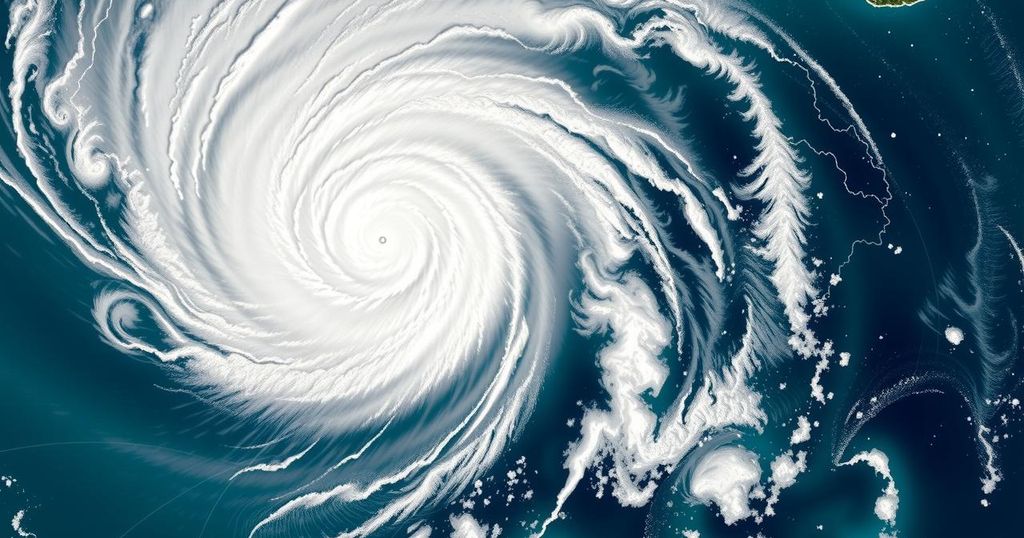Weather
World news
AFRICA, ANA CRISTINA, CHI, CHIDO, CLIMATE CHANGE, DIANA, DISASTER MANAGEMENT, EUROPE, FRANCE, FREDERIC LEGUILLIER, INTERIOR MINISTRY, MAYOTTE, MOZAMBIQUE, MOZAMBIQUE NATIONAL METEOROLOGICAL INSTITUTE, NAMPULA, NATIONAL EMERGENCY OPERATIONS CENTER, NATIONAL WEATHER SERVICE, NATURAL DISASTER, NATURAL DISASTERS, PARIS, RAIN, ZIMBABWE
Fatima Alavi
0 Comments
Cyclone Chido Approaches Indian Ocean Islands with Severe Impacts Expected
Cyclone Chido is approaching Comoros, Madagascar, and Mayotte in the Indian Ocean, prompting emergency preparations. Comoros has closed schools, and Madagascar issued alerts to residents. Mozambique anticipates damage affecting over 2.5 million people. The French government is deploying resources to Mayotte in anticipation of the storm’s impact. The region faces increased cyclone severity due to climate change, necessitating preparedness to prevent humanitarian crises.
The Indian Ocean islands of Comoros, Madagascar, and Mayotte are preparing for the anticipated arrival of Cyclone Chido, which is advancing towards Africa’s eastern coast. On Friday, the government of Comoros ordered an immediate closure of schools in anticipation of the cyclone, which is expected to strike the islands by Saturday morning. The cyclone is projected to pass by the northern region of Madagascar before directly impacting Mayotte, which has been placed on red alert by the French weather agency starting Friday night, indicating severe weather conditions ahead.
On the mainland, Mozambique has issued a red alert for its northern provinces of Cabo Delgado and Nampula, where it is estimated that over 2.5 million individuals may require evacuation as the cyclone nears land. Ana Cristina, director of Mozambique’s National Emergency Operations Center, emphasized the urgency of the situation by stating, “We believe that we can initially start working with an estimate of around 2.5 million people in the provinces of Cabo Delgado and Nampula who may be affected and will need to be rescued.”
In Madagascar, precautionary alerts have been disseminated through cell phone messages and radio broadcasts to ensure residents are adequately informed and prepared. Authorities have also commenced evacuations in the northern region of Diana, where the impact of Cyclone Chido is expected to be most severe. It is estimated that nearly 20,000 people in this area may be affected, prompting local officials to distribute emergency supplies such as food, water pumps, and generators since Tuesday.
In response to the anticipated effects on Mayotte, the French government is deploying approximately 110 emergency personnel, including firefighters and emergency response specialists, alongside three tons of essential emergency equipment to assist with any impending damage. Col. Frédéric Leguillier, head of Mayotte’s fire and rescue service, noted that the assistance includes search and rescue dogs and personnel trained in rubble recovery.
The cyclone season in the region, which spans from December to March, has recently seen a rise in the frequency and intensity of storms attributed to climate change. Cyclone Idai in 2019 claimed over 1,300 lives across Mozambique, Malawi, and Zimbabwe, while Cyclone Freddy resulted in significant fatalities last year. Crisis24, a risk management firm, underscores the potential for Cyclone Chido to induce destructive flooding and landslides, raising concerns about subsequent outbreaks of waterborne diseases like cholera, as previously experienced after Cyclone Idai.
The Indian Ocean region experiences a cyclone season from December to March, characterized by intense storms that often lead to significant humanitarian crises. Cyclone Chido is the latest in a series of severe weather events that have impacted the area, with past cyclones such as Idai and Freddy resulting in considerable loss of life and infrastructure damage. Given the changing climate, meteorological patterns are becoming increasingly volatile, prompting authorities to heighten preparedness measures across vulnerable regions, particularly in island nations and coastal territories.
As Cyclone Chido approaches, the islands of Comoros, Madagascar, and Mayotte are bracing for severe conditions, with numerous emergency measures activated to protect residents. The potential impact extends to Mozambique, where millions could be affected by the storm. The coordinated efforts among local and international agencies highlight the urgent need for preparedness in light of the growing severity of cyclones, which appear to be exacerbated by climate change. Proactive measures are essential to mitigate the anticipated impact of this storm.
Original Source: abcnews.go.com




Post Comment